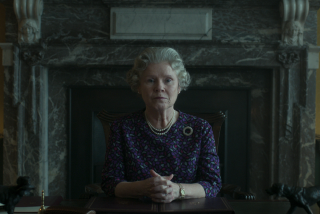A Bittersweet Tale About a Love That Wasn’t Meant to Be : MRS. JORDAN’S PROFESSION, The Actress and the Prince <i> by Claire Tomalin</i> ; Knopf; $27.50, 448 pages, illustrated
- Share via
A splendid account of English theater during the late 18th and early 19th Centuries as well as lively political and social history, “Mrs. Jordan’s Profession” is a scintillating biography that concentrates on the life of an extraordinary performer and an amazing woman: the gifted, resilient and indefatigable Dora Jordan.
She was at the height of her career, a favorite in a variety of Shakespearean roles, Restoration comedy, and the new works of Richard Brinsley Sheridan. Already the mother of three children, she so captivated Prince William that she would spend the next 20 years of her life as his wife in all but name. Although they became the loving parents of 10 more children and were models of domestic bliss, the marriage of an heir to the throne and an actress was unthinkable.
As the third son of King George III, William had no great expectation of inheriting the throne, and had been shipped off to the navy, where he served briefly and without distinction. Upon his ignominious return, he was made the Duke of Clarence, given an allowance, an apartment in St. James Palace and instructions to mend his rough ways.
He had been profligate even for a prince, and “had resorted to loose women on a scale even his naval companions found spectacular.” Even so, the witty novelist Fanny Burney found him reasonably handsome, “full of sport and mischief, yet clever withal as well as comical.”
Though Jordan was then living contentedly with Richard Ford, their long relationship had begun to cool and she was in no position to refuse the ardent attentions of a royal suitor. She and William began their life together in a house on the Thames (somewhat grudgingly offered by the royal family) and soon discovered a mutual gift for family life.
Jordan continued to work in the theater, playing the most arduous roles in the repertoire virtually up to the moment she delivered her babies, returning to the stage after only a few weeks of recuperation.
The Duke was only too happy to have a successful wife, and willingly allowed her to supplement his own scanty income. The only obstacle to their joy was the press, which mocked their happy union with a leering viciousness still hardly equaled.
*
In addition to her formidable acting abilities, Jordan had an enchanting singing voice and a talent for composing music of her own. Her energy seemed boundless, equal to every new baby and a professional schedule that would leave a contemporary actor reeling. When the London season was over, Jordan would often tour the provincial cities, leaving the grand country house she shared with the duke and her children for austere and often wretched lodgings on the road.
She was a diligent correspondent, and the surviving letters she wrote to her children and the duke show a rare combination of tenderness and practicality. Although her situation was precarious and the royal family treated her with condescension and scorn, she accepted their coldness as unavoidable under the circumstances and endured it with amazing good nature, eventually winning a measure of grudging admiration.
For years, her children had no surname, but finally they were allowed to be called FitzClarence. Although the prefix advertised their previously unrecognized parentage, they at least had plenty of company in that reckless age, and as they grew up to be accomplished, the stigma faded. For 20 years, Jordan’s life seemed not only charmed but stable, given her personal circumstances and her risky occupation.
All that abruptly changed in 1812. Under duress from the royal family and his various advisers, the duke was persuaded to abandon the woman who had been his delight and his support. He courted various eligible young royals in the hope of gaining a legitimate heir to the throne, but never prevailed until the age of 53, when he finally married a young German princess. There were no children of that morganatic union, despite William’s impressive record with Jordan.
Jordan spent her last years in exile in France, attended only by a woman who had been a governess to her children. The mother of 13, adored and celebrated by a nation, the loyal and loving companion of the man who became King William IV in 1830, Jordan died alone in St. Cloud, at 55. Without question, she was one of the most astonishing personalities of the age, as this spirited and scholarly biography makes so clear.
More to Read
The biggest entertainment stories
Get our big stories about Hollywood, film, television, music, arts, culture and more right in your inbox as soon as they publish.
You may occasionally receive promotional content from the Los Angeles Times.










